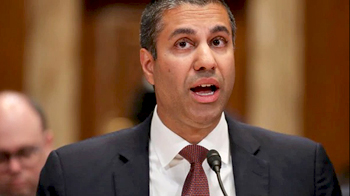Washington, Jun 13: India is pursuing bold strategies to achieve the ambitious goal of universal Internet access by 2022, a top American official has said, highlighting the challenges in building broadband networks in rural areas.

"I commend Prime Minister Modi and the Indian government for their ambitious goals of universal Internet access by 2022 and fixed broadband access to 50 per cent of households by 2022," Federal Communications Commission Chairman Ajit Pai said at the India Ideas summit of US-India Business Council here on Wednesday.
"To meet these targets, they're pursuing bold strategies such as installing two million public Wi-Fi hotspots in rural areas and redesigning and expanding the Universal Service Obligation Fund, he said.
Pai said despite the good news, millions of Indians and Americans still live in rural areas where there is currently no case for the private sector alone to build broadband networks.
"As is the case in parts of Assam, Uttarakhand, and Karnataka, we have communities in Alaska, Utah, and Kansas that don't have access," he said.
To connect these communities, FCC's Universal Service Fund provides federal subsidies to private carriers to leverage additional investment. The US has begun allocating some of this support by using a reverse auction, which harnesses market forces and a diverse array of technologies to maximise the impact and efficiency of this investment, he said.
Just this week, FCC authorised USD167 million in universal service subsidies to connect 60,000 unserved rural homes and businesses in some of the hardest-to-connect corners of the US. "Obviously, India's connectivity challenges are significantly different in nature and scale," Pai said.
Observing that 5G could be transformative, enabling things like telemedicine and precision agriculture, automotive safety and gaming, industrial IoT and other breakthroughs that one can't even conceive today, Pai said one of their top priorities is to protect the security and integrity of the communications supply chain.
That's why the FCC has proposed to prohibit the use of the broadband funding we administer to purchase equipment or services from any company that poses a national security threat to the integrity of United States communications networks or the communications supply chain, he said.
That's why the FCC denied the application of China Mobile USA, a wireless carrier ultimately owned by the Chinese government, to provide international telecommunications services in the United States, he said.
When making decisions that impact 5G security, in particular, one needs to remember that the implications are wide-ranging. 5G will affect militaries, industries, critical infrastructure, and much more. The procurement and deployment decisions made now will have a generational impact on the country's security, economy, and society.
When it comes to 5G, we cannot afford to make risky choices and just hope for the best. We must see clearly the threats to the security of our networks and act to address them. And the more that allies like the United States and India can work together and make security decisions based on shared principles, the safer that our 5G networks will be, Pai said.
Pai said he is looking forward to working with Indian and American business communities in the days ahead to connect, to propel, and to secure the digital future of the United States and India two strong allies and two good friends.







Comments
Add new comment